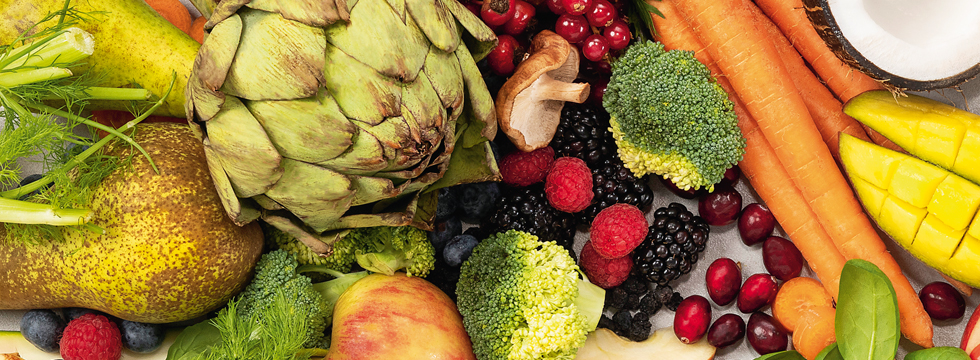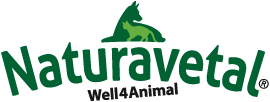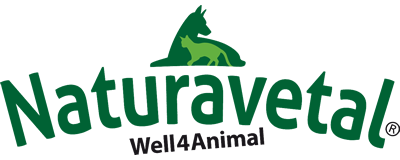
Vital Vitamins
The word “vitamins” comes from Latin: “Vita” meaning “life”. Vitamins are vital – especially for the health of our animals, because without vitamins, the proteins, carbohydrates and fats cannot be fully employed. Every day millions of biochemical reactions take place in the bodies of dogs and cats. Vitamins support body processes and are necessary for growth, energy production, feelings and sensory perceptions, but also for digestion, detoxification, elimination and ultimately for warding off diseases and strengthening the immune system. They are indispensable in the construction of cells, blood cells, bones and teeth. Each individual vitamin fulfills certain tasks. An insufficient supply of vitamins will result in serious deficiency symptoms. Therefore, vitamins must be supplied with food for the animal, as they are essential for the metabolism and much more.
Many dog and cat owners read the feeding tables on the pet food labels, noting the amounts of the individual vitamins and believing that their animal is well provided for by the high amounts.
The decisive factor, however, is not the question “how much” but “how good”, because it’s all about the usability of the vitamins. In addition, artificially added vitamins can be more harmful than useful. Only enzymes ensure that vitamins and minerals are even effective. Effective means that enzymes break down vitamins and minerals to activate good metabolism. Only enzymes can cause cell division, which is why enzymes and phytochemicals are among the most important quality requirements of a good animal feed. Naturavetal provide strong seedlings in the feed to ensure an adequate supply of enzymes, vitamins and minerals.
In any case, a natural vitamin supply will provide the best availability for the body. Natural vitamins can be effective immediately without any additional burden on the metabolism in the body. Natural animal feed from Naturavetal supplies a purely natural vitamin intake, it is free of any synthetic additives. Our vital vitamins document informs you about the individual vitamins and their tasks and effects in the body.
For further questions please contact Naturavetal.

Vitamin A - Retinol
When it is found in plants it is known as a provitamin. Vitamin A is found in liver, milk, fish oil and egg yolk. It is necessary for a good skin, the night vision of the animals and for cell growth. Lack of vitamin A results in dry skin, growth disorders, increased susceptibility to infectious diseases, and bone growth disorders.

Vitamin B1 - Thiamin
Vitamin B1 (thiamine) is a water-soluble and heat-sensitive vitamin. Vitamin B1 is found in many foods including yeast, cereal grains, beans, nuts, and meat. It can also be found in algae. In the true sense of the word vitamin B1 has no storage function, so it is important that a continuous intake of foods containing thiamine leads to a sufficient supply. Deficiency symptoms include cardiovascular failure and convulsions, paralysis, muscle weakness, nerve inflammation and gastrointestinal dysfunction. Thiamine is involved in the breakdown of certain amino acids. It also has a regulating effect on carbohydrate metabolism. It is important for thyroid function, for nervous activity and in the metabolism of carbohydrates.

Vitamin B2 - Riboflavin
This is found in milk, yeast, liver, lung, forestomach and whole grains. Riboflavin is water soluble and can easily be absorbed by the body. Its storage duration lasts no longer than 2 - 6 weeks in the body. Vitamin B2 deficiency is manifested in skin lesions such as redness or dandruff, brittle, blunted nails, and opacity of the eye lens as well as changes in the nervous system.

Vitamin B3 - Niacin
Niacin is an important nutrient. In fact, every part of your body needs it to function properly. It is a vitamin-active substance that is found in both animal and vegetable foods. It is mainly found in muscle meat, offal and cereals (whole grains). It is also known as nicotinic acid, this is an organic compound and a form of vitamin B3. Niacin, like vitamin D, is produced in the metabolism. It is produced as a by-product in the degradation of amino acid. The storage capacity of niacin in the body is only two to six weeks. It is only currently available in the organism in the required quantities. A lack of niacin is shown by loss of appetite, insomnia and reduced performance. Distinct symptoms of niacin deficiency are manifested by changes in the skin and mucous membranes, especially in those exposed to sunlight.

Vitamin B5 – Pantothenic Acid
This vitamin is present in all foods. The richest are liver and herring. In vegetable products, we find it mainly in whole grains, cauliflower and broccoli. This vitamin is very heat stable and helps the food eaten to be converted into energy. Deficiency symptoms are rare. Deficiency symptoms are expressed by severe metabolic disorders, which can then lead to cramps, reflex disorders and changes in the skin and mucous membranes. The task of vitamin B 5 is the formation of cholesterol and ketone bodies, as well as the synthesis and degradation of fatty acids.

Vitamin B6
This is a vitamin group found in both plant and animal foods. The individual groups differ only in that they react differently to heat. For example, there are lower losses of vitamin B6 when cooking vegetable foods than with animal products. Overall, the bioavailability is very high as they can be absorbed directly from the gut. Vegetable-derived vitamin B6 needs to be broken down by the body for absorption. Food sources with vitamin B6 are wholemeal grains, bananas, meat and liver. In metabolism, the water-soluble vitamins have only a short storage capacity. After 2 - 6 weeks, the reserves are used up. Deficiency symptoms that result from a deficiency of vitamin B6 are skin changes, dermatitis, muscle cramps and sensory disorders, formation of oxalate stones (type of kidney stones) in the urine.
The task of vitamin B6 is varied, it is also involved in the production of hemoglobin, the protein in blood that carries oxygen throughout the body. It is helpful in the formation of certain neurotransmitters and hormones (such as histamine, dopamine and sterotonin). Importantly, it participates in the metabolism of amino acids. It also affects the functions of the nervous system and the immune system. Protein-rich diets and a lack of essential fatty acids generally increase the vitamin B6 requirement. A lack of vitamin B6 leads to loss of appetite, impaired growth, even anemia can occur.

Vitamin B12 - Cobalamin
Vitamin B12 occurs in almost all body cells and is important for cell division. It is a nutrient that helps keep the body's nerve and blood cells healthy and helps make DNA, the genetic material in all cells. Therefore, deficiencies of vitamin B12 in the bone marrow cells, where erythropoiesis (formation of red blood cells) takes place, become noticeable. It is needed for protein metabolism and for the nervous system and the regeneration of the mucous membranes. Deficiencies of B12 lead to disorders of the small intestine, the stomach, the pancreas or increased bacterial colonization of the intestine. Vitamin B12 is exclusively formed by microorganisms and absorbed by the consumption of animal products. It can be stored in the liver for a long time and occurs in fish, liver, kidneys and offal. A herbal vitamin B12 is supplied by sea buckthorn. A constant intake of B group vitamins puts a strain on the liver as it is stored there and released when needed. The addition of these vitamins is therefore unnecessary in healthy animals with a normal intestinal flora.

Vitamin C – Ascorbic Acid
The biosynthesis of this vitamin in the organism is possible via the glycoside metabolism. This vitamin is synthesized in the liver or kidneys of the dog and the cat. The storage capacity is very low, so the vitamin must be constantly supplied. It is very sensitive to light, air, water and heat. Vitamin C fulfills a variety of tasks in the body. It is involved in healing wounds, it supports the formation of adrenal cortex hormones such as adrenaline, it initiates antioxidant processes in the body (helping to protect cells from the damage caused by free radicals), it captures free radicals and prevents diseases e.g. certain cancers. It improves the absorption of iron in the small intestine and removes toxic heavy metals such as lead, nickel and cadmium. It binds itself to the heavy metals and thereby flushes it out of the body.
Vitamin C converts cholesterol into bile acid or vitamin D through enzyme conversion. It generally improves the immune system by increasing the activity of defense cells. Vitamin C helps to reduce dental cavities and is important in the control of anemia and bleeding. In the case of working dogs, such as sled dogs or service dogs, a temporary additional supplement has proven itself worthwhile, in infections, liver diseases or after operations.

Vitamin D
Vitamin D is responsible for increasing intestinal absorption of calcium, magnesium, and phosphate. It is needed for bone formation and is particularly important for growing dogs and cats as well as for new born animals. It is present in yeasts in large quantities. In foods of animal origin, it is mainly found in fish such as salmon. It is mainly stored in the liver. In the case of vitamin D deficiency, the absorption capacity of calcium is reduced. Similar to vitamin A, vitamin D, also has very good storage properties. It is excreted only in relatively small quantities. An overdose of vitamin D can quickly lead to damage to the animal. Symptoms of an overdose of vitamin D include calcification of the blood vessels and large joints, bloody diarrhoea (diarrhoea), nausea, vomiting, increased thirst, muscle weakness and increased urine levels. Early vascular calcification can subsequently cause kidney failure, metabolic problems of all organs, heart failure and arthrosis. By contrast, vitamin D is extremely important in the prevention of rickets and osteoporosis (bone loss).

Vitamin E
This is a purely herbal product. Vitamin E occurs in nuts, vegetable oils, seeds and grains. The benefits of vitamin E are partially explored. It is believed to aid in the assembly and stabilization of biological membranes as well as in the synthesis of some enzymes and nerve related muscle functions. But it has been proven that vitamin E is an antioxidant protective substance that binds free radicals and supports energy production. Vitamin E plays an important role in aiding and repairing in reproduction, muscle atrophy and liver damage. Positive effects are attributed to it as a cancer protection and in cardiovascular diseases. A vitamin E deficiency can lead to central nervous disorders and retinopathies (damage to an eye on the vitreous). An overdose causes dizziness, nausea and muscle weakness. Puppies and kittens as well as pregnant and lactating mothers require a higher vitamin E intake.

Vitamin H - Biotin
Biotin is present in almost all foods in smaller quantities. In animal foods, the largest amounts can be found in calf's liver and salmon. Biotin is present in plant food in an unbound form and can therefore be better utilized. We find it in peanuts, soybeans and oatmeal. This is a fairly stable vitamin, however it reacts very unstably with heat, especially in combination with an acid, and loses a high proportion of its bioavailability. A biotin deficiency manifests itself in hair loss, mucosal changes of the intestine, it can also lead to diarrhea, fatigue and muscle aches. The role of biotin in the body is in the breakdown and utilization of amino acids and fatty acids.

Vitamin K
There are the natural vitamins K1 and K2, however on the other side there is the synthetic and unhealthy vitamin K3. Low quality feeds tend to contain additional vitamin premixes. Naturavetal does not use vitamin K3. Natural vitamin K occurs in green vegetables, herbs and algae, fish, liver and eggs. Vitamins K1 and K2 pass through the blood into the bone marrow, liver and kidneys. It is saved there for up to a maximum of 14 days and is then eliminated via the bile and kidney. Vitamin K is responsible for blood clotting and effectiveness of the blood flow. Vitamin K1 activates the calcium metabolism (binds calcium ions), in which the protein is supported by osteocalcin (which limes the bone). Without vitamin K1, this process cannot take place. A deficiency of this vitamin is thus shown by reduced coagulation of the blood and disturbed bone metabolism. Bacteria in the gut produces Vitamin K, but for optimal utilization, it should be an addition to the diet. Lack of vitamin K may occur after antibiotic or sulfonamide treatment. These treatments damage the intestinal flora, which is responsible for the production of vitamin K.






